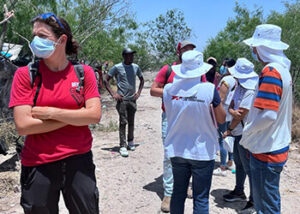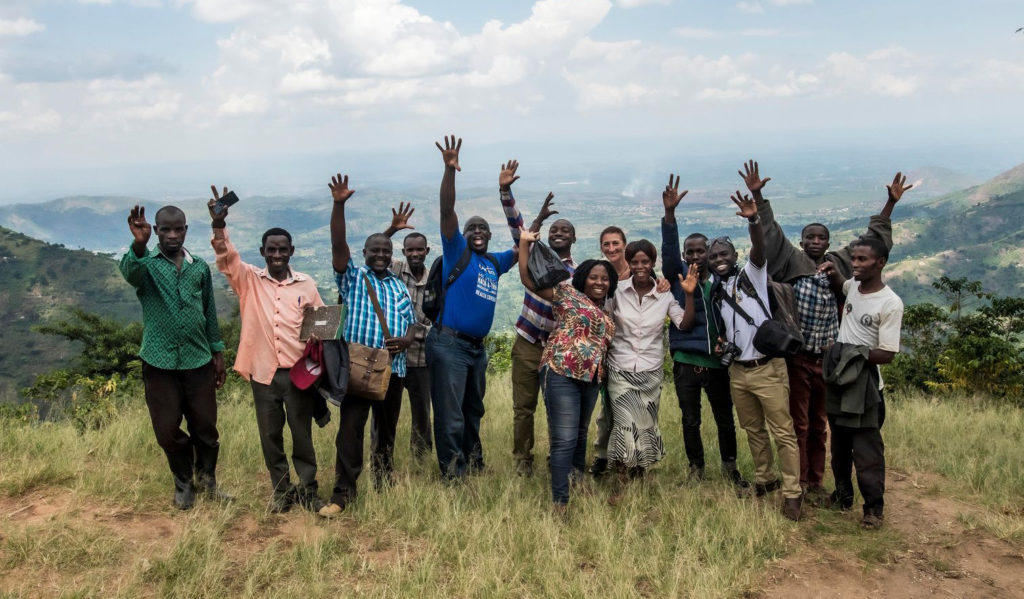Since 2012, Massachusetts General Hospital’s Global Disaster Response and Humanitarian Action (GDRHA) program has deployed teams of doctors, nurse practitioners, midwives, nurses and technicians in response to the full spectrum of humanitarian — natural or man-made — emergencies. “Our philosophy is that we want to go where we can have greatest impact,” says GDRHA Director Lindsey Martin, NP. That philosophy has taken Ms. Martin and her team from places like the earthquake-ravaged streets of Haiti to the crowded migrant camps along the US/Mexico border. And, most recently, to war-torn Ukraine. We asked Ms. Martin, who also works as an intensive care unit nurse practitioner, about her team’s current challenges, how they determine where to deploy and how philanthropy supports their wide-ranging efforts.
What is your team’s biggest challenge at the moment?
Ukraine is front and center in most people’s minds, obviously. We’re on the ground in Poland and Moldova helping refugees, and in Ukraine providing support to local caregivers. It’s a terrible situation, and the scale of the suffering is incomprehensible. The big challenge we’re facing, however, is that migration is a universal crisis. And with so many resources being diverted to the crisis in Ukraine, it is limiting the ability of aid programs like ours to make a difference in other places with resources spread thin.

New families arrive at the US/Mexico border every day. These are people fleeing persecution and violence. But, as a society, we have a very dehumanized view of what’s going on down there.
We’ve actually had Ukrainians come through the border clinics in Mexico. The difference is that the United States government has a policy called United for Ukraine, which allows Ukrainians to enter the country as refugees, obtain visas and be relocated for 12 months. Migrants from other countries without refugee status, despite having equally legitimate claims of asylum, are forced to wait for their immigration hearings in dangerous shelters and tent cities in Mexico. These people also need our help.
With all that’s going on in the world, how does the GDRHA team select how and where to deploy?
Given our limited resources, it’s something we put a great deal of thought into. First, we consider accessibility. Flying our teams to Texas, where they can cross the border every day to work in the clinics, is a lot easier than flying them to places like Ethiopia or Yemen. It enables us to minimize our cost and travel time and maximize our time on the ground helping patients. We also consider the safety of our teams. We want to be sure they have the security infrastructure they need to be protected and provide care. Finally, we build relationships with strong local partners that enable us to work efficiently and sustainably.
We also think deeply about how our work connects back to Mass General. Through the Asylum Clinic — another part of the Center for Global Health — we are already working with asylum-seeking migrants in neighborhoods like Chelsea, Mass., many of whom are from Central and South America. You can trace a direct line from these local migrant families right back to the border. When you think of it that way, the world starts to look much smaller. And that perspective informs our strategy and how we leverage Mass General’s programs and expertise to help this imperiled population.
How can philanthropy play a role in your work?
We put this program together on a shoestring budget. Increased philanthropic support would strengthen our ability to flexibly scale and tailor the care and services we provide. For example, since we know that migrant caravans often include many pregnant women, it would mean being able to add OB/GYN staff when a migrant caravan is arriving. It would mean having translators when we need them. In October this year, almost 80% of the patients showing up to the border clinics were Haitian, but we didn’t have a Creole translator. That was a huge stumbling block. Our goal is to make a two-year commitment to provide unconditional, free medical aid to asylum-seeking migrants at the border clinics, but we need the resources to ensure it.

We’re also looking to expand the program. The border crisis continues, and demand is growing. In 2020, we had more than 10,000 patient encounters. That number doubled in 2021 and doubled again in 2022. We have a tremendous opportunity to make an even greater impact, but we need to grow in order to meet the need.
What sets the GDRHA team apart from similar programs at other academic medical centers?
What sets us apart is the level of institutional support here at Mass General. We are able to respond to global emergencies and continue addressing the ongoing global migrant health crisis, because we have the leadership, staff support and policies in place that enable us to train and deploy clinicians to respond to these crises, without impacting patient care at the hospital-level. I’ve heard people refer to us as “the world’s hospital.” Mass General has embraced humanitarian aid as part of its values-based mission. For most of us, responding to global challenges is just part and parcel of the work we do every day.
To learn more the Global Disaster Response and Humanitarian Action program and other Global Health initiatives at Mass General, contact us.

